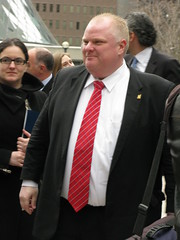 Stephen Harper and Rob Ford met yesterday in Scarborough to discuss gun violence in Toronto, where high-profile shootings at a block party and in an Eaton Centre food court have everyone on edge about a perceived rise in gun violence. If anything was decided at the meeting, neither the prime minister nor the mayor is prepared to let anyone in on their plans just yet. One thing, however, seems clear: Mayor Ford has been told to back off suggesting that people convicted of gun crimes be “deported” from Toronto.
Stephen Harper and Rob Ford met yesterday in Scarborough to discuss gun violence in Toronto, where high-profile shootings at a block party and in an Eaton Centre food court have everyone on edge about a perceived rise in gun violence. If anything was decided at the meeting, neither the prime minister nor the mayor is prepared to let anyone in on their plans just yet. One thing, however, seems clear: Mayor Ford has been told to back off suggesting that people convicted of gun crimes be “deported” from Toronto.
In a post-meeting statement, Ford indicated only that he and Harper “shared a number of ideas” on how to “make sure we have the tools in place to better prevent gang violence and protect the public from criminals.” But when the mayor first called for a meeting with the prime minister, it was — as he said during an impromptu call in to a talk radio show — “to find out if there’s any laws with respect to the immigration and citizenship…status and the city. So people are caught — I don’t care if you’re white, pink or purple, I don’t care what country you’re from, I don’t care if you’re Canadian citizen or not — all I’m saying is, if you’re caught with a gun and convicted of a gun crime, I want you out of this city.” (Listen to a recording of Ford’s appearance on the show via the audio player, above.)
That statement was initially met with much derision and ridicule in print and online, but a Globe and Mail op-ed by Lorne Neudorf is now suggesting that there is some judicial precedent to the idea. However, though Neudorf writes that “banishment is an instrument in the judicial toolkit,” he also concedes that courts consider such judgments to be exceptional and case-specific. In 1968, Neudorf reports, the Manitoba Court of Appeal ruled that banishments should not be used to expunge undesirables by “foisting them off on other communities,” and a 1983 Northwest Territories Supreme Court decision warned against banishments that “solve a local problem at the expense of other communities.”
It would seem, therefore, that the tools Ford and Harper aim to have in place won’t include the unenforceable, unprecedented, and likely unconstitutional idea of running a whole bunch of people out of town.
Photo by West Annex News

